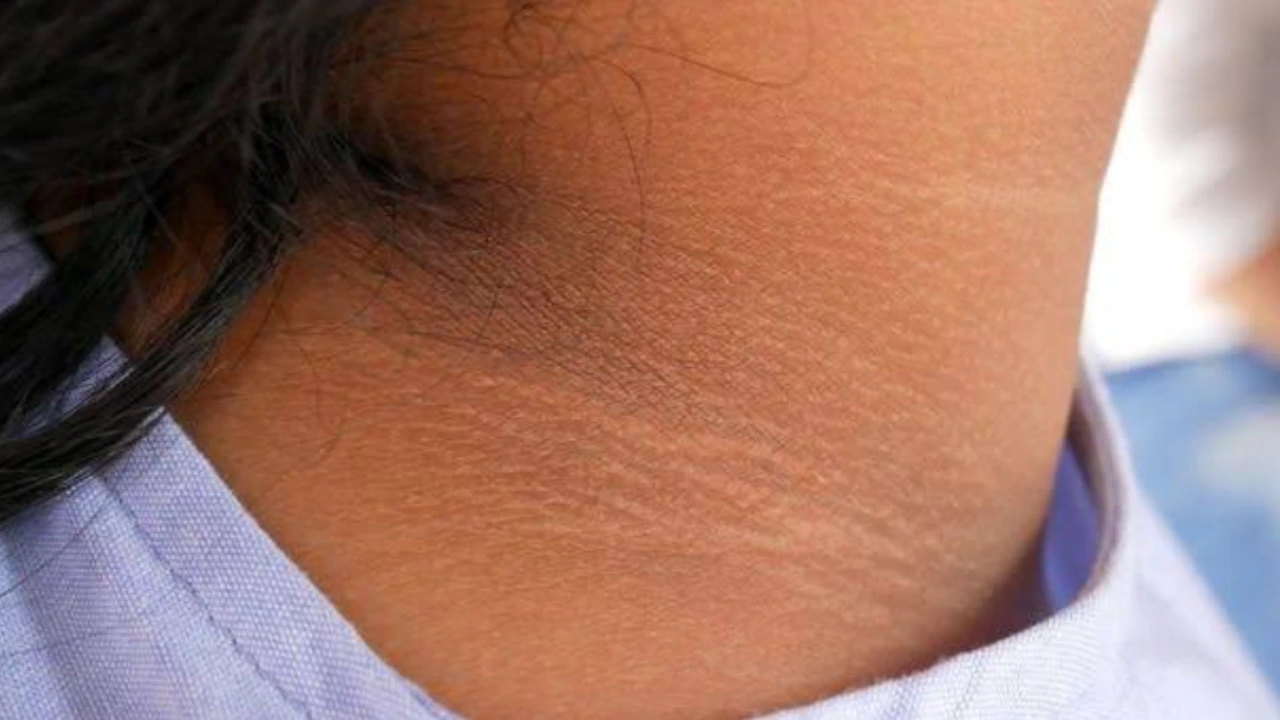Acanthosis nigricans is a skin condition that turns darker, thicker, and velvety in texture. Acanthosis nigricans usually occurs in body folds, such as the armpits, neck, or groin.
Acanthosis nigricans can be experienced by anyone, but is more common in obese people. Although not contagious and not dangerous, this condition can be a sign of a more serious health disorder.
Causes of Acanthosis Nigricans
The cause of acanthosis nigricans is not yet known for certain. However, this disorder often occurs due to increased insulin levels and insulin resistance . There are several conditions that are thought to trigger acanthosis nigricans, namely:
Insulin resistance
Most people with acanthosis nigricans have insulin resistance. In this condition, insulin cannot work effectively so that blood sugar levels increase. As a result, people with acanthosis nigricans can develop type 2 diabetes .
Increased insulin levels also cause skin cells in some parts of the body to turn over faster, making certain areas of the skin appear darker than the surrounding skin.
Hormonal disorders
Acanthosis nigricans often occurs in people with diseases that affect hormones in the body, such as Addison’s disease, Cushing’s syndrome, polycystic ovary syndrome (PCOS), or hypothyroidism.
Autoimmune disease
A number of autoimmune diseases, such as lupus , Sjögren’s syndrome, scleroderma, and Hashimoto’s disease can cause acanthosis nigricans.
Cancer
Other factors, such as cancer in the stomach, intestines, or liver, can also cause acanthosis nigricans.
Use of medications and supplements
In addition to being caused by certain medical conditions, acanthosis nigricans can also be triggered by the use of drugs and supplements, such as birth control pills, corticosteroids , or high doses of niacin .
Other factors that increase a person’s risk of developing acanthosis nigricans are:
- Comes from a dark skinned race
- Having a family member with acanthosis nigricans
- Being overweight or obese
Symptoms of Acanthosis Nigricans
Acanthosis nigricans is characterized by changes in skin color, such as gray-brown, blackish , or darker than the surrounding skin. In addition, the skin of acanthosis nigricans sufferers will be drier, rougher, thicker, velvety textured skin , and itchy and smelly.
Please note, these skin discoloration cannot disappear just by wiping or rubbing with soap.
Changes in skin color and texture due to acanthosis nigricans can occur in several areas of the skin, such as the neck , lips, armpits, palms, knuckles, elbows, knees, groin, and soles of the feet.
When to see a doctor
See a doctor if your skin changes color to gray-brown, blackish, or darker than the surrounding skin. An examination is necessary immediately if the symptoms appear suddenly, spread quickly, and cause discomfort.
You are also advised to have regular check-ups with your doctor if you have been diagnosed with acanthosis nigricans. The goal is to monitor the results of treatment and the development of the condition that causes acanthosis nigricans.
Diagnosis Akantosis Nigrikans
To diagnose acanthosis nigricans, the doctor will ask questions about the symptoms experienced, the patient’s and family’s medical history, and the history of drug and supplement use. After that, the doctor will perform a physical examination by looking at changes in skin color and texture.
The doctor will also carry out supporting examinations to confirm the diagnosis, including:
- Blood tests , to check insulin, blood sugar, thyroid and hormone levels
- Skin biopsy , to detect abnormal tissue so that the cause of acanthosis nigricans can be identified.
- Scans, such as CT scans or MRIs, to detect tumors and cancer.
Acanthosis Nigricans Treatment
The goal of treating acanthosis nigricans is to address the underlying cause. Here are some methods that can be done to treat acanthosis nigricans:
- Weight loss
Acanthosis nigricans sufferers who are overweight are advised to lose weight with a healthy diet and regular exercise. - Surgery
If acanthosis nigricans is triggered by a tumor or cancer, surgery to remove the tumor or cancer may be an option. - Laser therapy
Laser therapy is done using laser beams. This therapy aims to reduce the thickness of the skin. - Medications
Doctors will prescribe medications to improve hormone levels if acanthosis nigricans is caused by hormonal disorders. Doctors will also prescribe blood sugar lowering medications to patients with diabetes.
In addition to undergoing the above treatment, acanthosis nigricans sufferers are also advised to do the following to improve the appearance and condition of their skin:
- Using a skin lightening cream that contains retinol, alpha hydroxy acids, or salicylic acid
- Use antibiotic cream if you have a secondary skin infection.
Complications of Acanthosis Nigricans
Changes in skin color and texture due to acanthosis nigricans can interfere with the sufferer’s self-confidence. Acanthosis nigricans is also often a sign of diabetes in young age , and is associated with an increased risk of developing type 2 diabetes later in life.
If acanthosis nigricans is caused by certain conditions, such as untreated obesity, then the following complications may arise:
- Increased blood sugar
- Sleep apnea
- metabolic syndrome
- Heart disease
Prevention of Acanthosis Nigricans
The best way to prevent akatonis nigricans is to avoid the risk factors. These preventive measures include:
- Limit foods high in sugar to lower and prevent increased blood sugar levels
- Maintain ideal body weight by consuming healthy and balanced nutritious food and exercising regularly.
- Consult a doctor before taking any medications or supplements.
References :
Popa, M. et al. (2019). Acanthosis Nigricans: To be or not to be afraid. Oncology Letters Journal, 17 (5), pp. 4133–8.

